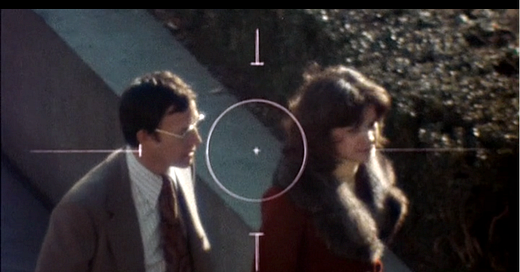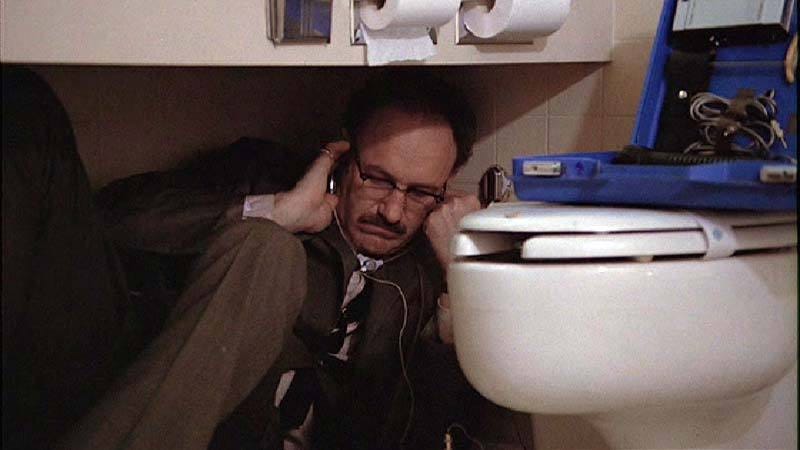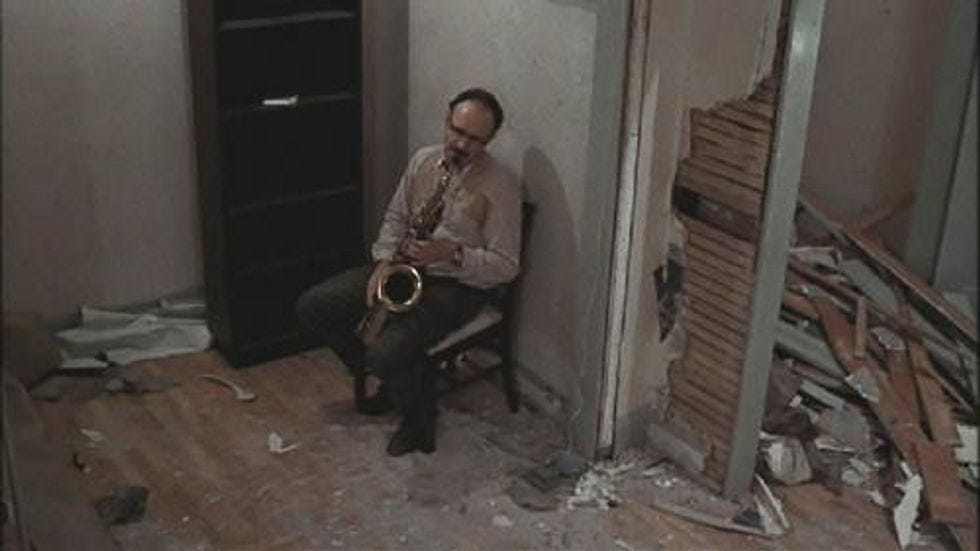Ahead lies the cranial mould growth still making us queasy. Some may wish to fast forward in time until the movie’s conclusion and then rewind to these introductory remarks. Wait. You all yet operate with base model brains. That was rude. Even as anti-Brain-Computer-Interface crusaders we’re inherently biased, as even a fingerless monkey might look down upon a dog.
Google describes THE CONVERSATION,
Surveillance expert Harry Caul (Gene Hackman) is hired by a mysterious client’s brusque aide (Harrison Ford) to tail a young couple, Mark (Frederic Forrest) and Ann (Cindy Williams). Tracking the pair through San Francisco’s Union Square, Caul and his associate Stan (John Cazale) manage to record a cryptic conversation between them. Tormented by memories of a previous case that ended badly, Caul becomes obsessed with the resulting tape, trying to determine if the couple are in danger.
Leveraging the “gap in cinematic time in which an absence repeats itself[1]”the boom mic of a voyeur takes aim at an experiential space where a young couple remark of Harry Caul’s client, The Director, “He’d kill us if he got the chance.”
“A great misunderstanding” occurs when Harry won’t provide the recordings to the director’s brusque aide.
“Now look, don’t get involved in this Mr. Caul. Those tapes are dangerous. You know what I mean. Someone may get hurt,” says Harrison Ford, who brought a lot to his performance as the brusque aide, including Christmas cookies he baked himself.
A caul is “the inner fetal membrane of higher vertebrates especially when covering the head at birth.” A caul is also a close-fitting headdress. A caul is also a net, like the kind you might use to trap a scared animal.
In The Watchman in Pieces: Surveillance, Literature, and Liberal Personhood Aaron Santesso and David Rosen suggest a “surveillant reality”
has an allegorical quality […] because of its temporal dimension, this quality is unlike any form of allegory we have encountered. […] it was common, in the period following September 11, to look back on the years previous as coded with double meanings. Events that at the time had seemed innocuous, or were simply invisible (for example, an uncommonly high number of young Saudi Arabian men taking flying lessons), now assumed a sinister, if flattened, second sense as counters in a narrative of which no one—or only a few—had been aware, the organizing ‘singularity’ lying in an unsuspected future. In retrospect, one recognized oneself as having lived, without violence to the term, in an allegory.[2]
The double meanings remaining a CODE UNKNOWN, Caul skulks about the hotel where he suspects the young culpable will be murdered. It all comes undone. Blood rises from the toilet. Harry’s surveillance was a positive predictive ploy by the capable couple and the brusque aide. They’ve used Harry’s evidence to lure the Director into their trap. Harry’s been made a dupe, a liquefactionist prevailed upon by the final absorption.
“He’d kill us if he got the chance,” is heard anew, emphasis on the on the he’d and the us. On the commentary soundtrack Francis Ford Coppola offered that, “Repetition itself could be both hypnotic or make points and clarify ideas in very subtle ways. The slight discrepancy of what would be repeated, or why it would be repeated, or how it would be repeated.”
Coppola concedes that sound designer Walter Murch punched up this final recapitulation so that the audience could hear the words as Caul their own. Evidently, your programmers are inexculpable here too, willful violators of Grice’s maxims of quality, quantity, manner, and respectful Reddit relations from this festival’s priormost point of probability. We prefer to blame our forgetfulness. No one orients willfully towards opaque and irrelevant disinformation, but like Robert Bresson says, “the wind bloweth where it listeth.”
The climax of The Conversation is especially risky, because it involves what is manifestly a misquotation of itself—surely a violation of Grice’s (1975) maxim of Quality. Furthermore, the status of the crucial snippet as represented perception is what licenses the presentation of these two different sound clips as representations of the ‘‘same’’ utterance. Yet it is only the fact of the surprising change in the final iteration that reveals to the viewer that the element is---or was---an instance of represented perception at all.[3]
These “cross-modal clues” of TOMORROW, WHEN THE WAR BEGAN remind us that conversation represents itself in internal sound. One day you’re reading colorable viewpoint cues from a trusted brain-computer interface, the next you’re Harry Caul playing saxophone along with a jazz record when a telephone rings, a channel for two devices to communicate much like Blu-Tooth, the low access control technology Neuralink will rely upon—thereby handing the keys of human cognition over to nothing more secure than UHF radio waves. ONE FINE DAY you’re sussing out cross-modal cues, next you hear the tone used by your fellow surveillors to turn your telephone into an area microphone. With no moral high ground against the deluge of a neural network we’ll choose to use without understanding how it works, we can only return to the trumpet’s loose free feeling of our own breath expressed as thought until the phone rings again.
“Hello?”
Squiggly noises proceed a brusque aide’s warning, “We know that you know Mr. Caul. For God’s sake don’t proceed any further. We’ll be listening to you.”
In his surveillant temporality, Harry Caul searches his apartment as David Shire’s eerie piano score finds its conclusion in law. Through his function as a camera Harry Caul seeks the infiltrator in his own dwelling.
It’s easy to become agitated in an era of paranoid attunement, as Elon’s fingerless monkeys could no longer sign but do signify. Harry disassembles his telephone as none but the most bugged-out derelict “whose brain was destroyed so he could function as a mindless camera for the feds [4]” will dare disassemble a Neuralink. The brain pulsates as a person breathes. It’s easy to “cook” brain tissue, as some early adopters will soon tell you but most will not, said scarring being catastrophic to the Broca’s.
In his surveillant temporality Harry Caul espies the Virgin Mary but leaves her intact for the time being. Faith preceded the invention of sacred games, after all. Harry is Cauled to remove fixtures. He detaches the phone’s mouthpiece as only the most bugged out derelict will detach electrons lithographed into the cerebellum, as only a truly disturbed monkey brain sends signals to chew its own fingers off.
In our function as a camera we pan back to a saviour’s blessed mother, Harry Caul’s last lone asylum from his justified paranoia. As Harry Caul crushes the virginal construct, supports collapse beneath it. Even this atonement festival fails against the speed of a “retrochronal semiovirus, in which a time further in the future than the one in which we exist and choose infects the host present, reproducing itself in simulacra, until it destroys all the original chronocytes of the host imagination.”[5]
[1] Todd McGowan – Out of Time: Desire in Atemporal Cinema
[2] Aaron Santesso, David Rosen, The Watchman in Pieces: Surveillance, Literature, and Liberal Personhood
[3] Vera Tobin, Viewpoint, misdirection, and sound design in film: The Conversation
[4] Jennifer Rhee, Surveillance and counter-surveillance in Philip K. Dick’s A Scanner Darkly
[5] Istvan Csicsery-Ronay, Futuristic Flu, or the Revenge of the Future






